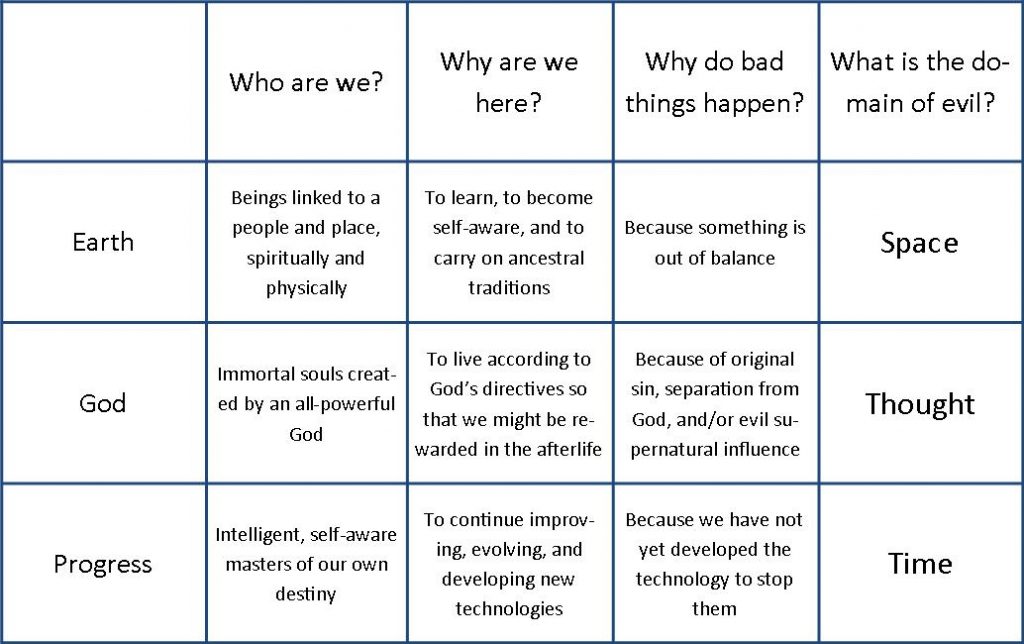What Does the Religion of Progress Really Believe?
“Sustainable growth” was all the rage a few years ago. I don’t hear the phrase so much anymore, which can only be a good thing. It should be patently obvious that growth cannot be sustained. Something can either be growing, or sustaining, but not both. “Sustainable growth” is a futile attempt to bring the concept of sustainability into a world that believes in infinite, indefinite growth, and that stubbornly refuses to contemplate the end of growth. A world, in other words, that believes in Progress.
The word “sustainability” has been neutered by Progress-ites to mean something like “nice”, but I wish to reclaim its original meaning. Sustain-ability. The ability to be sustained. Indefinitely. Sustainability in this sense is effectively the opposite of growth or progress. No matter how much we might wish otherwise, it is impossible to achieve infinite growth on a finite planet.
My goal here is to flesh out the religion of Progress a bit more than in my original table.

The religion of Progress provides answers to existential questions, but it also dictates an approach to life that is best elucidated, I feel, in contrast to a worldview based on true sustainability. Based on my time within both worldviews, I have a fairly good idea of some of these differences, which are expressed in the table below.
Progress
Sustainability
Value of history
The Past Was Bad.
We need not look to
the past for lessons or answers.
The past has much to tell us about what
works well over the
long term and what is ultimately
unsustainable.
Cost/benefit analysis
The benefits of a new technology are assumed to exceed the costs based on simple short-term safety tests, unless or until unequivocally proven otherwise.
The costs of a new technology are assumed to exceed the benefits until all conceivable mechanisms of short-term and long-term harm have been ruled out.
Problem solving
Problems represent opportunities to develop new technology. Technological solutions are prioritized over simpler solutions, especially if the simpler solutions require abandonment of technology.
Problems are usually best solved by addressing their causes, even if this requires cessation of an activity or abandonment of a technology. Technological solutions are likely to cause additional cascading problems.
Decision-making timescale
Implications of decisions are assessed no more than 25-50 years into the future, with the assumption that new technologies will be developed as needed.
Implications of decisions are assessed for at least seven generations.
Product durability
Functionality and cost are prioritized over durability, with the assumption that most buyers will choose to upgrade before a product wears out.
Durability is prioritized to minimize energy input and waste. Many products are passed down from generation to generation.
Medicine
Modern medicine represents a triumph over a dark, disease- and pain-ridden past. Medical interventions should be encouraged whenever possible.
Modern medicine represents rather clumsy tinkering with an incredibly complex system that we do not fully understand. Natural health and wellness should be prioritized whenever possible.
Vaccines
Vaccines are sanctified wards between civilized modern life and the evil, disease-ridden past. As such they are trusted based on limited testing and granted immunity from liability.
Vaccines, like any new technology or medicine, shall not be assumed to have a net benefit until they have been fully tested, alone and in combination, over short- and long-term time-spans.
Externalized costs
Externalized costs of a land-use practice or new technology may be ignored, within the bounds of human and environmental laws.
Externalization of costs is not allowed. All costs must be included in a cost-benefit analysis,
Bioregionalism
Geography does not meaningfully inform culture. Global trade and connectivity can bring any product or idea to any location.
Humans must be rooted in land and community to build reciprocal relationships that can be sustained indefinitely.
Value of elders
Elders possess largely obsolete knowledge, skills, and ideas. They should be safely cared for and visited occasionally.
Elders possess essential wisdom gleaned from a lifetime of experience. They should be respected and consulted when making decisions.
It is clear to me that the religion of Progress is not merely reaching the end of its useful life; it is actively preventing us from building a more sustainable world. Just as sustainable progress is impossible, so too is sustainability within the religious framework of Progress. The values are too often at odds. Should we wish to move toward sustainability, we will need to find new answers to our existential questions. Answers rooted not in the egoic godhood of human intelligence but in reciprocal relationships with the living world we inhabit.
